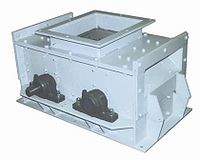Difference between revisions of "Sampler Crushers"
Jump to navigation
Jump to search
(Created page with "Category:Particle Size Reduction{{Knoppen}} <noinclude><!------------------------------------------------ * READ THIS FIRST * Only edit this page if you can improve the c...") |
PurplePen19 (talk | contribs) |
||
| Line 5: | Line 5: | ||
* Please do not edit the sponsored link on the top right corner. . | * Please do not edit the sponsored link on the top right corner. . | ||
* Please start editing this page after the /noinclude | * Please start editing this page after the /noinclude | ||
* -------------------------------------------------></noinclude> | * -------------------------------------------------></noinclude> | ||
[[File:Sampler crushers_1.jpg|thumb|200px|right|Sampler crushers]] | |||
'''Sampler crushers''' reduce particle size by hammering on the product and interparticulate attrition. There is no need for substantial static breaker plates and they are of a compact construction. Sampler crusher is ideal for continuous sampling systems in industrial power plants and coal handling facilities. | |||
==Materials Crushed== | |||
*Coal: clean coal, lignite (brown coal), bituminous, sub-bituminous and Anthracite | |||
*Ash: ash temperatures up to 350 deg. C | |||
*Coke: petroleum coke, metallurgical coke, green or calcined | |||
*Glass: glass cullet | |||
*Fertilizer and potash: MAP, DAP, potash ore and flake, among others | |||
*Salts: rock salt, solar salt, KCl, NaCl | |||
*Lime: burnt lime, ag lime, hydrated lime | |||
*Friable materials: ash, boiler slag, nuts and nut shells | |||
Latest revision as of 08:07, 15 October 2012
Sampler crushers reduce particle size by hammering on the product and interparticulate attrition. There is no need for substantial static breaker plates and they are of a compact construction. Sampler crusher is ideal for continuous sampling systems in industrial power plants and coal handling facilities.
Materials Crushed
- Coal: clean coal, lignite (brown coal), bituminous, sub-bituminous and Anthracite
- Ash: ash temperatures up to 350 deg. C
- Coke: petroleum coke, metallurgical coke, green or calcined
- Glass: glass cullet
- Fertilizer and potash: MAP, DAP, potash ore and flake, among others
- Salts: rock salt, solar salt, KCl, NaCl
- Lime: burnt lime, ag lime, hydrated lime
- Friable materials: ash, boiler slag, nuts and nut shells
